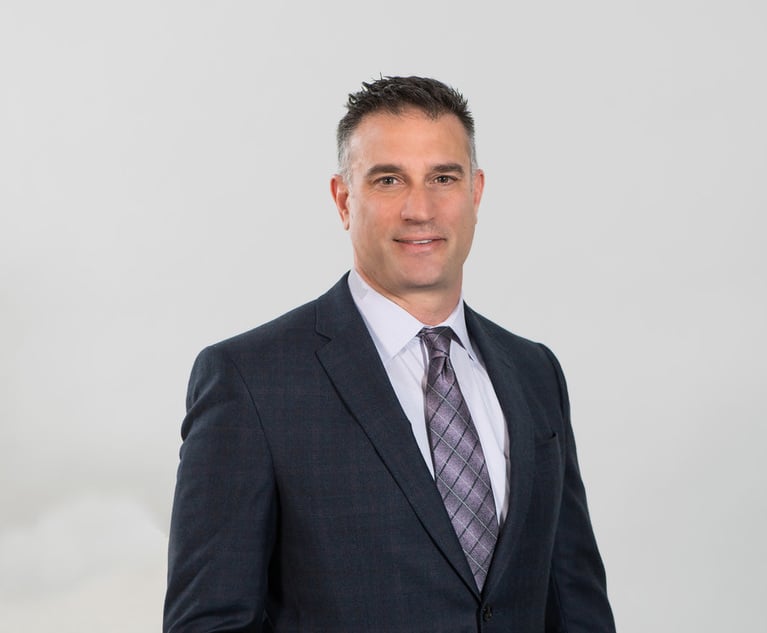Pa. Supreme Court Approves Pilot Providing CLE Credits for Pro Bono Service
With a new pilot program coming online soon, attorneys in Pennsylvania will no longer have to split time between earning CLE credits and performing pro bono services for the community, but instead will be able to do both at the same time.
May 10, 2018 at 01:20 PM
4 minute read
 Photo: Phil Foster
Photo: Phil Foster With a new pilot program coming online soon, attorneys in Pennsylvania will no longer have to split time between earning continuing legal education credits and performing pro bono services for the community, but instead will be able to do both at the same time.
In early May, the state Supreme Court announced the approval of a pilot program that will allow attorneys to get CLE credit for providing pro bono legal services through certified legal service providers. The program allows for attorneys to earn one CLE credit for every five hours of pro bono service, and up to three credits per year toward their annual requirement of 12 CLE credits.
“The Pennsylvania Supreme Court is committed to providing access to justice for all and has a long-standing history of support for providing civil legal aid for those with limited resources,” Supreme Court Justice Sallie Updyke Mundy said. “This pilot program furthers our commitment to legal aid while providing opportunities for licensed attorneys to fulfill their annual CLE requirements.”
According to Stacey Witalec, a spokeswoman for the Administrative Office of Pennsylvania Courts, although it has not yet been finalized, it is anticipated that attorneys will not be charged any fees for the CLE credits they earn through the pro bono work.
The pilot program is set to begin in 2019, and is expected to last three years, but bar association and legal aid organizations are already lauding the Supreme Court for the new program.
Samuel Milkes, executive director of the Pennsylvania Legal Aid Network, said he is looking forward to the program, and greatly appreciates the Supreme Court's decision to implement the pilot.
“We think it will be very helpful to the provision of civil legal aid,” he said. “It certainly creates more opportunities and more incentives for the many pro bono lawyers to provide pro bono services to clients.”
Philadelphia Bar Association chancellor Mary Platt said the new program will facilitate the association's efforts that are already underway aimed at providing legal services to the community and legal education to attorneys.
She noted that the association offers CLE courses with the goal of training attorneys on the legal skills they need to provide pro bono legal work, and the bar often pairs with legal aid groups to provide clinics on issues including expungements, naturalization and immigration status changes.
“The pilot program now will facilitate our efforts to do all those things at the same time,” Platt said. “We're looking at this pilot program making our association even more the go-to CLE provider.”
The Supreme Court's announcement came on the heels of another big change for CLE in Pennsylvania, as the Pennsylvania Bar Association recently assumed control of the Pennsylvania Bar Institute, which focuses on providing CLE to attorneys across the state.
The decision came after audits showed the PBI lost more than $4.1 million between 2015 and 2017 and had been operating since Jan. 1 at an operating loss of roughly $44,000 per week. In April, the PBI board, which has many members in common with the PBA board, voted to eliminate the PBI's officers and directors.
Although some have questioned what the development will mean for CLE in Pennsylvania, in a recent interview with The Legal, outgoing PBA president Sharon Lopez said the move was done “to keep the gold standard of CLE in the marketplace and in order to preserve the brand that PBI has.”
According to the AOPC's announcement, the new pilot grew out of efforts spearheaded by former Philadelphia Bar Association chancellor Alan Feldman and former CLE board chairman Robert Heim.
In 2005, Feldman established a task force on CLE and pro bono services to develop a program that would provide CLE credits for pro bono services. The group analyzed the concept and, in 2006, provided recommendations to both the Supreme Court and the CLE board, which adopted a resolution supporting the task force's call to create the program.
This content has been archived. It is available through our partners, LexisNexis® and Bloomberg Law.
To view this content, please continue to their sites.
Not a Lexis Subscriber?
Subscribe Now
Not a Bloomberg Law Subscriber?
Subscribe Now
NOT FOR REPRINT
© 2025 ALM Global, LLC, All Rights Reserved. Request academic re-use from www.copyright.com. All other uses, submit a request to [email protected]. For more information visit Asset & Logo Licensing.
You Might Like
View All
Litigating the Written Word: Parol Evidence Rule and the Gist of the Action Doctrine in Fraud Claims
6 minute read


Trending Stories
- 1'A Death Sentence for TikTok'?: Litigators and Experts Weigh Impact of Potential Ban on Creators and Data Privacy
- 2Bribery Case Against Former Lt. Gov. Brian Benjamin Is Dropped
- 3‘Extremely Disturbing’: AI Firms Face Class Action by ‘Taskers’ Exposed to Traumatic Content
- 4State Appeals Court Revives BraunHagey Lawsuit Alleging $4.2M Unlawful Wire to China
- 5Invoking Trump, AG Bonta Reminds Lawyers of Duties to Noncitizens in Plea Dealing
Who Got The Work
J. Brugh Lower of Gibbons has entered an appearance for industrial equipment supplier Devco Corporation in a pending trademark infringement lawsuit. The suit, accusing the defendant of selling knock-off Graco products, was filed Dec. 18 in New Jersey District Court by Rivkin Radler on behalf of Graco Inc. and Graco Minnesota. The case, assigned to U.S. District Judge Zahid N. Quraishi, is 3:24-cv-11294, Graco Inc. et al v. Devco Corporation.
Who Got The Work
Rebecca Maller-Stein and Kent A. Yalowitz of Arnold & Porter Kaye Scholer have entered their appearances for Hanaco Venture Capital and its executives, Lior Prosor and David Frankel, in a pending securities lawsuit. The action, filed on Dec. 24 in New York Southern District Court by Zell, Aron & Co. on behalf of Goldeneye Advisors, accuses the defendants of negligently and fraudulently managing the plaintiff's $1 million investment. The case, assigned to U.S. District Judge Vernon S. Broderick, is 1:24-cv-09918, Goldeneye Advisors, LLC v. Hanaco Venture Capital, Ltd. et al.
Who Got The Work
Attorneys from A&O Shearman has stepped in as defense counsel for Toronto-Dominion Bank and other defendants in a pending securities class action. The suit, filed Dec. 11 in New York Southern District Court by Bleichmar Fonti & Auld, accuses the defendants of concealing the bank's 'pervasive' deficiencies in regards to its compliance with the Bank Secrecy Act and the quality of its anti-money laundering controls. The case, assigned to U.S. District Judge Arun Subramanian, is 1:24-cv-09445, Gonzalez v. The Toronto-Dominion Bank et al.
Who Got The Work
Crown Castle International, a Pennsylvania company providing shared communications infrastructure, has turned to Luke D. Wolf of Gordon Rees Scully Mansukhani to fend off a pending breach-of-contract lawsuit. The court action, filed Nov. 25 in Michigan Eastern District Court by Hooper Hathaway PC on behalf of The Town Residences LLC, accuses Crown Castle of failing to transfer approximately $30,000 in utility payments from T-Mobile in breach of a roof-top lease and assignment agreement. The case, assigned to U.S. District Judge Susan K. Declercq, is 2:24-cv-13131, The Town Residences LLC v. T-Mobile US, Inc. et al.
Who Got The Work
Wilfred P. Coronato and Daniel M. Schwartz of McCarter & English have stepped in as defense counsel to Electrolux Home Products Inc. in a pending product liability lawsuit. The court action, filed Nov. 26 in New York Eastern District Court by Poulos Lopiccolo PC and Nagel Rice LLP on behalf of David Stern, alleges that the defendant's refrigerators’ drawers and shelving repeatedly break and fall apart within months after purchase. The case, assigned to U.S. District Judge Joan M. Azrack, is 2:24-cv-08204, Stern v. Electrolux Home Products, Inc.
Featured Firms
Law Offices of Gary Martin Hays & Associates, P.C.
(470) 294-1674
Law Offices of Mark E. Salomone
(857) 444-6468
Smith & Hassler
(713) 739-1250





